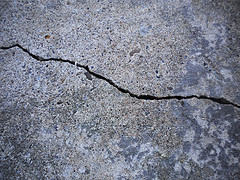Northern winters are rough on concrete. Driveways, floors, paths … for months on end, any outdoor concrete surface on your property has been exposed to continual freeze-thaw cycles and possibly salt or other chemical snowmelt products. You may not realize just how badly exterior concrete has been affected until the weather warms up and you start preparing your property for spring. So what are the common problems and how can you fix them? Better yet, how can you guard against damage to concrete in the future?

Cracked Concrete
Winter's freeze-thaw cycles cause the ground to contract and expand, which may lead to cracks in concrete surfaces, especially if the concrete installation was not done to top standards in the first place. Small cracks will affect only the appearance, without undermining structure, but medium- to large-sized ones must be taken care of as soon as possible. You can repair concrete floor or driveway cracks yourself with polyurethane concrete crack sealant. Be sure to protect your eyes with goggles and your hands with waterproof work gloves when handling cement products.
Flaking Concrete Paint
If the paint on your concrete is flaking, it is important to find the reason, rather than just scraping and repainting. Concrete cracking is a common cause of flaking paint; repair the cracks as above. Painted concrete may also flake, bubble, and peel if the incorrect paint was used. Make sure that you choose a paint designed for use on exterior concrete surfaces. Finally, the source of the flaking may be dampness underneath the concrete. In this case, it's advisable to get professional help to deal with the moisture problem.
Pitted Concrete
De-icing compounds which are sprinkled on the roads in winter can be very damaging to concrete, leading to pitting and spalling. Even if you yourself don't use them on your drive, the compounds are brought home on the body of your vehicle and are then ground in by your tires. In their original state, de-icers don't freeze easily due to their high salt content; instead, they seep into the concrete, freezing when the temperature drops drastically or when they have been sufficiently diluted by snow or rain. Deep pits should be filled and the entire surface coated with a bonding agent.
Concrete Subflorescence
When snowmelt compounds evaporate, subflorescence (crystallization of salt particles) leads to flaking and spalling of your driveway and floor of your garage, as well as unattractive staining. Scrub the floor well with a solution that is designed to deal with the salt content (don't try to clean with just warm water or pressure washing, as these will tend to simply force the salt deeper into the concrete). Then apply a bonding agent if necessary.
Maintenance
Protect your exterior concrete by applying a penetrating sealer, preferably in spring (once outdoor temperatures have risen to 50 degrees F, even at night) or summer. Sealcoating your concrete driveway or flooring shields it against harsh sunshine in the warmer months, and will continue to protect it through the winter. Opinion varies as to frequency -- some concrete contractors recommend applying sealant annually, while others say that it is necessary only every 2-3 years. It depends to a great measure on the quality of the sealant and the severity of your local weather conditions. However often you sealcoat concrete, be aware that the process will increase surface slipperiness. To avoid this danger, add a non-slip compound to the mix.
After storms in winter or summer, promptly remove snow or clear away leaves and other debris, but be careful not to do further damage to the concrete by chopping up ice with the point of a shovel or, even worse, a pick.
Make sure that there is adequate drainage in the area of your driveway or patio.





